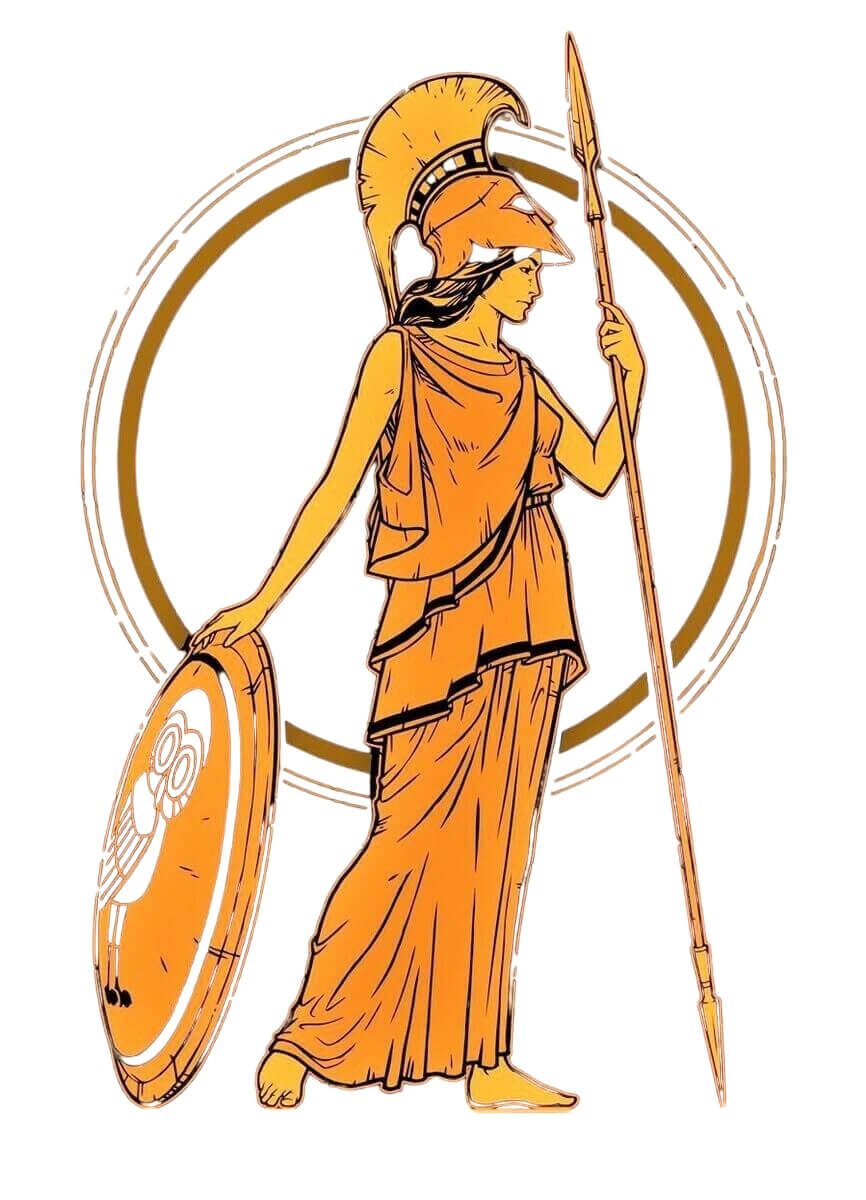Hera: Greek Goddess of lawful marriage and Queen of Olympus
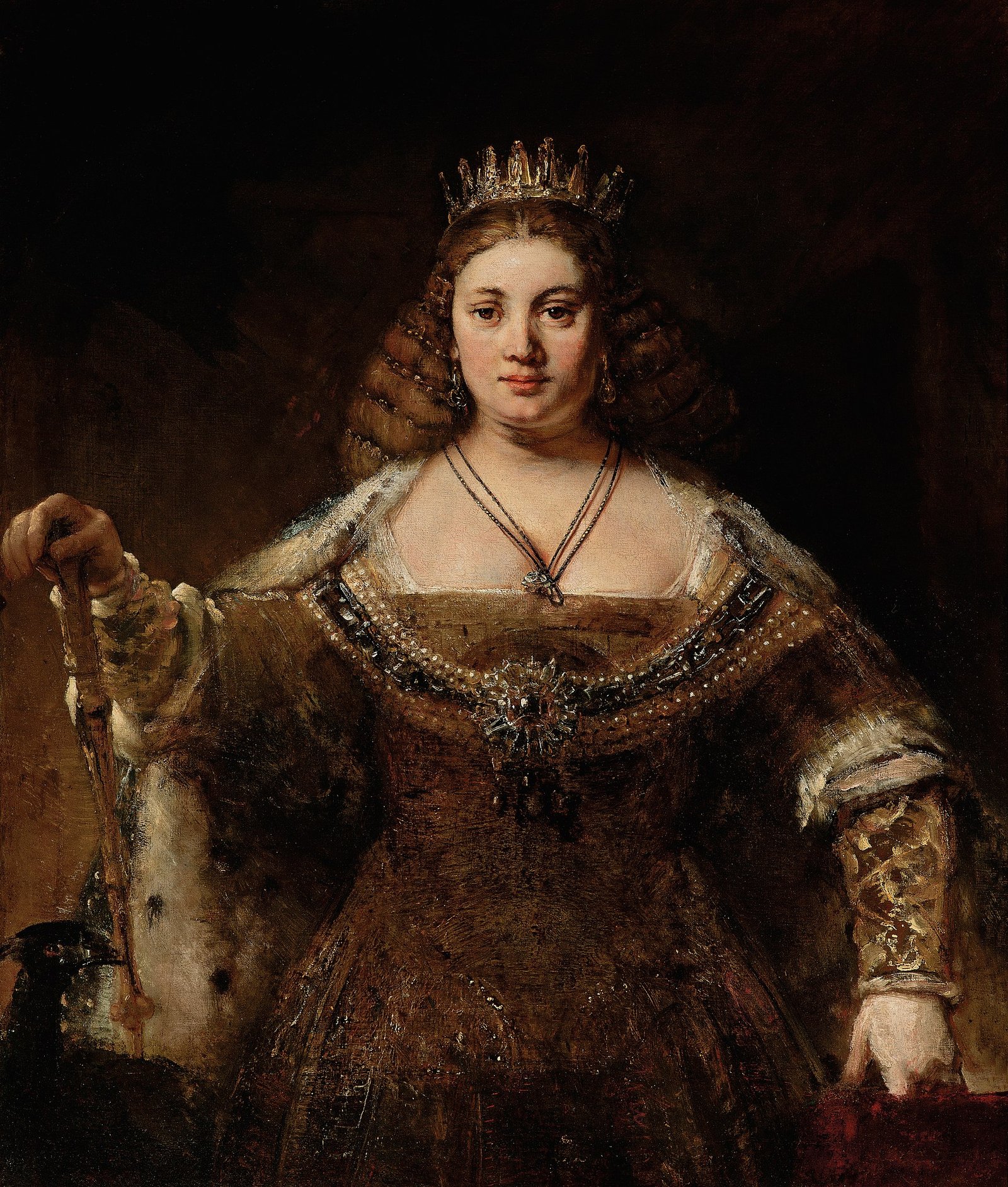
In Greek Mythology, Hera is the goddess of lawful marriage and vengeful wife of Zeus. She blesses the weddings and governs the marital unions. The jurisdictional and bureaucratic part of human society seems to be very well embodied by her depiction as a resentful and vindictive deity. In fact, she would never hear the voice of reason and would be fighting the heroes forever in time and beyond, with the sole purpose of glorifying her grueling draconian rules and institutions.
The queen of Olympus
Hera is the vengeful and jealous wife of Zeus. Therefore, only she dares to argue bluntly with the Thunderer and even to deceive him. Hera has a powerful and intimidating appearance. Majestic and formidable she always dresses long luxurious clothes and rides a splendid chariot drawn by two immortal horses. From time to time she rides down from Olympus to take a look at her tellurian domains. Fragrance spills over the land where Hera passes by; all living things bow down before her.
On Olympus Hera has a golden throne next to the throne of Zeus. In the same way as her divine husband, she disposes of thunder and lightning. In addition to her power and vindictiveness she possesses the might of storms and fogs. One of Hera’s sacred birds is the peacock. Because the many “eyes” on its tail symbolize the starry sky of which she is the mistress. Or perhaps the great many eyes, which would be controlling the mankind, if Hera possessed absolute power.
Zeus seduces Hera in the shape of cuckoo
Hera had a very willful character, therefore Zeus needed a long time to woo the future queen of Olympus. She answered harsh refusals on all his entreaties. Thus the king of gods had no other option, then the use of cunning and deceit. One day, when Hera was walking, a beautiful variegated cuckoo began to hover around her. Hera liked the bird, and with a merry laugh tried to catch it.
To her great surprise, she managed to catch the bird very easily. When she, caressed the cuckoo and pressed it against her beautiful breast, it suddenly turned into Zeus. Thereupon it was not Hera, who was pressing the bird to her, but Zeus, squeezing Hera tightly in his arms.
After such a kind of disgrace, Hera finally gave her consent to marry. Since that moment on, the cuckoo began to be considered the sacred bird of Hera. As a matter of fact, her royal scepter was decorated with the image of a cuckoo sitting on it.
Was that the wicked man, trying to force the law into his spouse, or the law becoming impregnated with love to his despicable nefarious nature?
It was better than that! It was the original moment when a vile envious man transgressed the law and made it be his wife and protector.
Oh, I am like a poor defenseless cuckoo. They are bad people they don’t let me abuse and harass them. Love me more, my beautiful Hera!
This is how the good rule transformed into a bad one and the lawyers became the wife of envy, vice and tyranny.
The wedding of Zeus and Hera
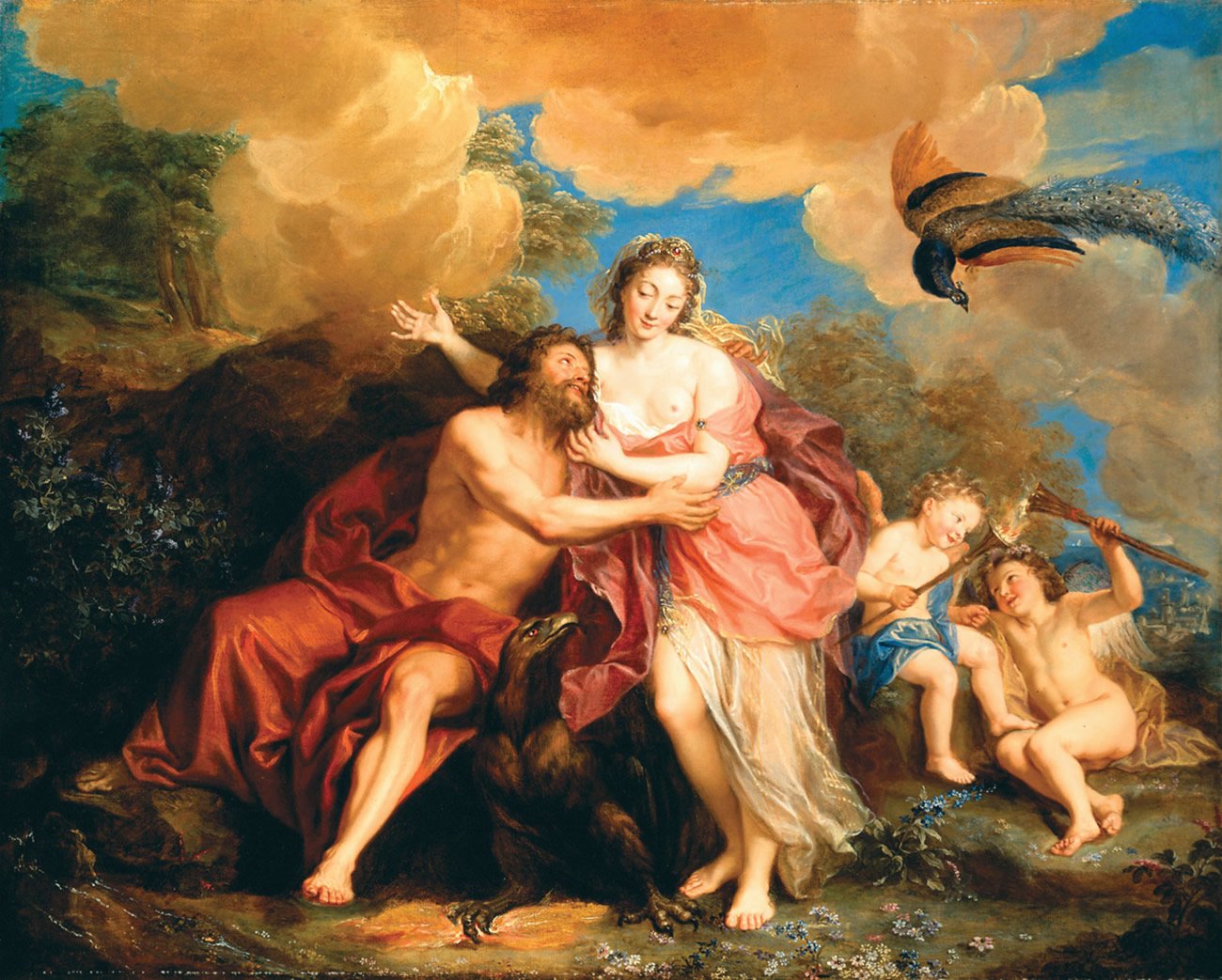
All the gods in the world had feasted the sacred marriage of Zeus and Hera. They bestowed them with amazing luxurious gifts, worthy of admiration. However, the most valuable was the gift from Mother Earth, Gaea. She gave Hera a marvelous apple tree with golden apples, said to concede eternal youth. The queen of Olympus placed the tree at the very edge of the earth. Thereafter it grew in the glorious garden of the Hesperides, the nymphs of the sunset. Hera left the dragon Ladon guard it in times to come. Henceforth the monster kept the outsiders away from its splendorous fruits.
The Earth gave everything to the mankind. But people allowed the unfaithful tyrant and the vindictive bourgeois to become their king and queen. Throughout a long time of ages and sorrows Hera personified the evil class of lawyers and clergy. Her marriage with Zeus brought nothing, but misery and a big frustration for the dream of eternal youth.
Acclaimed as an impressive tree with golden apples, the forbidden science never brought its marvelous fruits to humanity. Insomuch as all the inventions which could have changed and saved the mankind were not allowed to be commercialized. Therefore, people kept on starving, dying and aging, just because the capitalists (Zeus) and their lawful vengeful clergy – bureaucrats, lawyers, priests and the bourgeois (Hera) wanted to get another coin by the means of pollution and the damnation of scientists.
The branches of the golden tree never grew up another branches!
Hera as the goddess of lawful marriage and marital bonds
Hera is the patroness of family and lawful marriage. She binds spouses together, cares for the inviolability of the marital bond and fidelity in marriage. In addition, she also helps women in labor. Her daughter is Ilithyria – the goddess of birth and helper of laboring women.
On the other side as a goddess of marital bonds and fidelity Hera behaves as extremely vindictive deity. According to the Greek myths she looks like the patroness of customs and social rules of behavior. The queen of Olympus has to protect the bosom of the families, however, she seems to be ineffective and nugatory in her task. Insofar as her own husband is the greatest debaucher of Olympus and she often finds out of his infidelity with many different mortal women.
Terribly jealous, Hera tries to harm women on whom Zeus bestowed his attention. She pushed Semele into death and pursued her son Dionysus, ruining the life of his aunt Ino, who dared to take care of him until his adulthood. Furthermore, she hated Heracles with a fierce hatred of low mediocrity and caused him much suffering. One of the good examples of her repulsive vindictiveness towards women was the story of beautiful Io.
As Poseidon would say: “Hera embodies the way of a matron and highly-materialistic type of archon. If there is some kind of belief or idea in her arrogant head, for certain is the death of heroes. Hera is characterized by her harsh reproof towards warriors and strong independent masculine personalities. Just because Zeus is the opposite of what the hero is meant to be and he is still her husband. Hera craves love for Zeus – the Olympian miscreant, chasing skirts, because of being controllable and submissive, under her oppressive power. On the other side Zeus had damaged her self-confidence and self-respect. “Why I am not the best woman in the world?”
A widely known weakling and lamb of Zeus came from a spoilt kind of herd and used to disguise as a wolf, he must have excited her dreams of amorous passions.
Zeus and Hera: The archetypal model of lawful marriage
The marriage of Zeus and Hera is an illustrative example of a lawful marriage of convenience. The worldwide blamed supreme god married a despotic woman, who criminalized his infidelities and took her revenge upon them and their female protagonists – the lovers of Zeus. Throughout a long time of ancient history and culture, the Greeks molded their popular folklore by means of comedy, tragedy and philosophy. People and sages tried to give significance to things and characters of ancient myths, which they heard and retold from their early childhood.
Therefore, Zeus had existed as the absolute evil, admitted and tolerated by laws and people. Because almost everyone would be opting to act like him. Furthermore, because in the times of Ancient Greece, people didn’t have enough consciousness and philosophical understanding of democracy. That being the case the ideals of democracy, justice and freedom belonged to philosophers and ancient thinkers. In contrast the Greek polis had slaves and its citizens never cared about political justness.
Hera and the bureaucrats in Ancient Greece
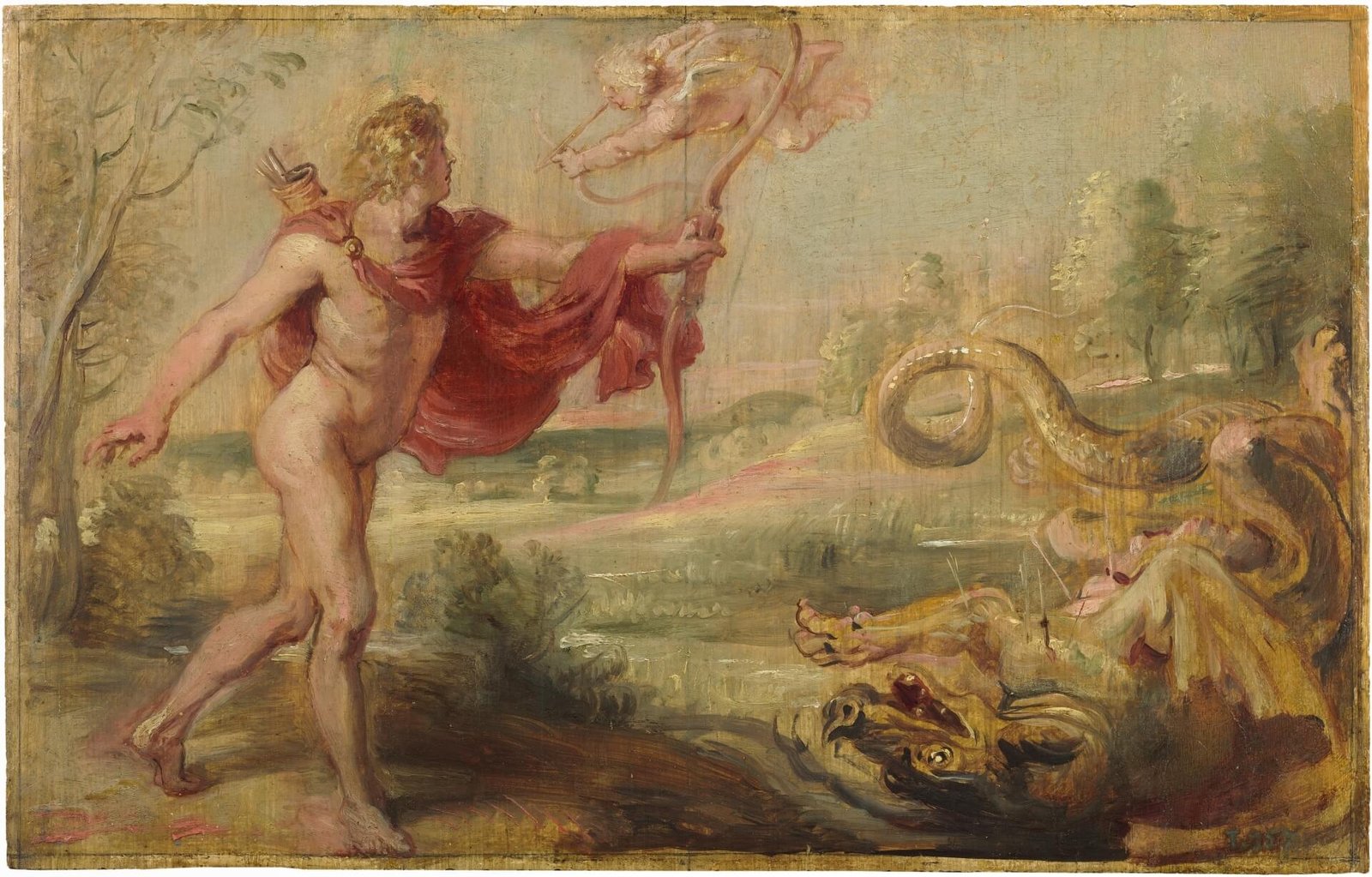
Having deceived the young beauty of Hera onto his malefic embrace, Zeus had made the new rules to pacify, punish and immobilize his adversaries. Sometimes the laws just adorned the written statues and no one opulent had followed them for real. However, many times Hera abused and tyrannized the most, almost like an unjust Draconian law, in such a way as it happened in the myth of Leto.
In fact, the name of the Athenian lawgiver Draco is equal to the word Dragon in Greek: Δράκων – Draco δράκων – dragon. That is to say, the dragon Python from the myth about Leto’s exile, and the birth of Apollo and Artemis is probably a forthright allusion to Draco and his Draconian unforgiving laws, characterized by their harshness and futility.
Therefore, Hera is the sardonic portrayal of unjust legislation and odious prosecutors of law. As well as of the bad archons and lawyers of Ancient Greece. Furthermore, Hera had also personified the sophists (prostitutes of knowledge according to Aristotle) and a certain part of Greek aristocracy. Although the most important fraction of them would have matched perfectly in the abyss of Zeus. So much as all the peasants and beggars, eager to become rich and violate the principles of justice and rectitude.
The man never liked the power of warriors, they were too handsome, strong and healthy for his envious slothful way of life. The beggar never was an artist, scientist or philosopher, thus he disrespected the might of intelligence. However, the share of evil between him and the king, united them earthly and above the bright clouds of Olympus.
Medusa vs The queen of Olympus
Isn’t Zeus a great example of worldwide heinous human nature? To support and praise your slaver, instead of saviors, because of envy. The breast of lawyers and sophists served to shelter the quintessence of such a rich slave, making him grow up as a devouring parasite in its disguise of an innocent cuckoo.
As Perseus, the slayer of archons (the assassin of kings), would clarify: Medusa includes Hera and all her legal falsities and injustices. Medusa is significantly more than the queen of Olympus. Insomuch as the main lies and acts of tyranny are being committed without any juridical support or acquaintance. An evil culprit robs or kills a good man without the surveillance and approval of the law. His act is full of uselessness and social perjury. It’s a falsehood and act of radical despotism. In essence the wrongdoer brings nothing but destruction of deserving human lives and loss of economic utility.
That being the case, the same act of felony belongs to the acts of injustice, there the criminal is the tyrant and his crime is an evil expression of tyranny.
To constrain and kill the useful individuals is detrimental for the prosperity of a country. Thus, it must be considered as a nasty jurisdictional falsehood and an act of tyranny. Such a draconian law is part of Hera and Medusa at the same time. Over and above, the bandits and evil-doers had always been like the illicit prolongation of governmental autocracy. They acted akin to the conceited popinjays from the ancient Athenian jurisdiction.
Therefore, Medusa is utterly more than the bad law, the archons, the clergy and Hera. She is self-existent, illegal and naturally present all around the world. Everywhere you go, there is a good chunk of evil wrongdoers, littering the roads of Hellas and beyond.
Hera and Io
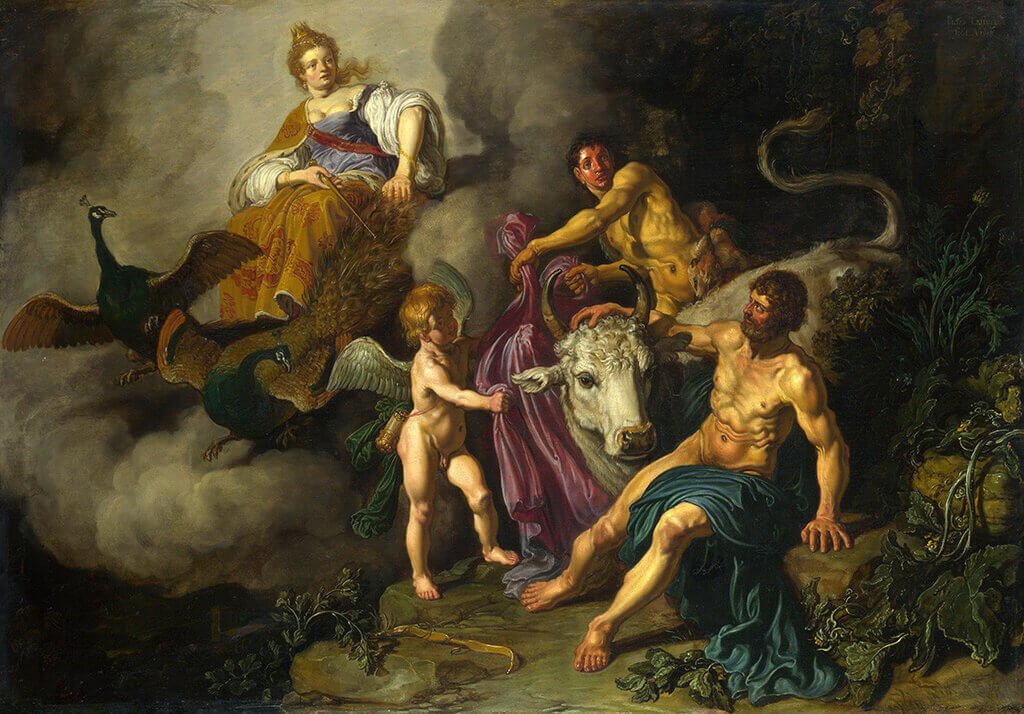
One day Zeus fell in love with beautiful Io, daughter of the river god Inachus. To hide her from Hera’s jealous eyes, he turned Io into a beautiful snow-white cow. However, Hera guessed the cunning of her husband and one day, when Zeus was in a good mood, she demanded the cow as a gift.
Zeus did not want to give Io to Hera, but there was nothing to do. After all, he didn’t want to reveal his infidelity. Thereupon Hera put a guard to the poor Io. He was her helpful servant, a hundred-eyed giant Argus Panoptes. He never slept during his time as a vigilant watchman. In fact, one pair of his odious eyes always maintained vigilance.
Hence no one could describe the terrible suffering of Io. For a long time, she stayed in the shape of a cow. Although, finally Zeus sent his son Hermes to kidnap her. Hermes came to Argus Panoptes, plunged him into a dream by dint of his magic wand, and afterwards cut off his head with one single blow of the sword. A time after, Hera placed the eyes of the giant on a peacock’s tail. Henceforth the beautiful bird always shimmers in a game of hundred colorful “eyes”.
Thereafter, Io was free again, but Hera did not leave her in peace. Immediately afterwards she sent a monstrous gadfly on her. With its terrible sting the gadfly pursued the unfortunate cow from one country to another. Minute by minute the sting of the gadfly pierced into her body, burning like a red-hot iron. And Io had run away, suffering from a terrible pain day after day.
The end of Io’s suffering
Finally, Io crossed the Bosporus strait, where the titan Prometheus was chained to a rock of mountain Caucasus. He advised her to head towards Egypt. The princess of Argos followed his suggestion and after many days of travel and different dangers reached the fertile shores of Nile.
Zeus found out about her arrival and gave her back the human form. On the banks of restful splendorous Nile Io gave birth to Zeus’s son Epaphus and daughter Ceroessa. Later she married the king of Egypt Telegonus. Their grandson Danaus returned to Hellas with his fifty beautiful daughters, named the Danaids. One of them became the mother of Abas, who was the first king of Argos and great-grandfather of Perseus, the legendary slayer of Medusa.
The Rebellion against Zeus
One day, tired and angry at Zeus, Hera incited the other gods to deprive the Thunderer of his indolent rule on Olympus, and some of them gave her support and help. Thereupon, the gods snuck up to the main chamber of Zeus and chained him up to his bed. All power of the sky and thunder could not help him break the golden chains. Since Hephaestus himself had forged the fetters.
Thereafter the rebels thought the matter to be solved and days after, the throne of Olympus had several suitors. The goddess Hera considered herself as the most indisputable for such a position, although Poseidon said to be the most powerful and Athena the most intelligent and victorious.
Unfortunately, the goddess Thetis, the same deity, who had once taken care of Hephaestus, brought upon Olympus the one hundred-handed giant Briareus from Tartarus. He managed to free the king of men from his imprisonment. The gods felt terrified in front of such a dreadful creature and couldn’t do anything to stop him. Briareus easily removed the golden chains from Zeus, and reestablished the usual worldwide order.
Zeus punishes Hera
Zeus’s punishment was quick and merciless. Hera was bound by her hands on golden chains between the sky and the earth. And so that the hanging would be heavier, Zeus tied to her feet heavy anvils. Therefore, she hung in such wise a long time, and no one dared to intercede for her, fearing the wrath of the supreme god.
Zeus pardoned his wife only when she swore by the waters of Styx that she never again would encroach on his power. And indeed, since then Hera no longer raised rebellions. She only occasionally gave free rein to her evil tongue, reproaching Zeus his countless treasons.
The meaning of Hera in Greek Mythology
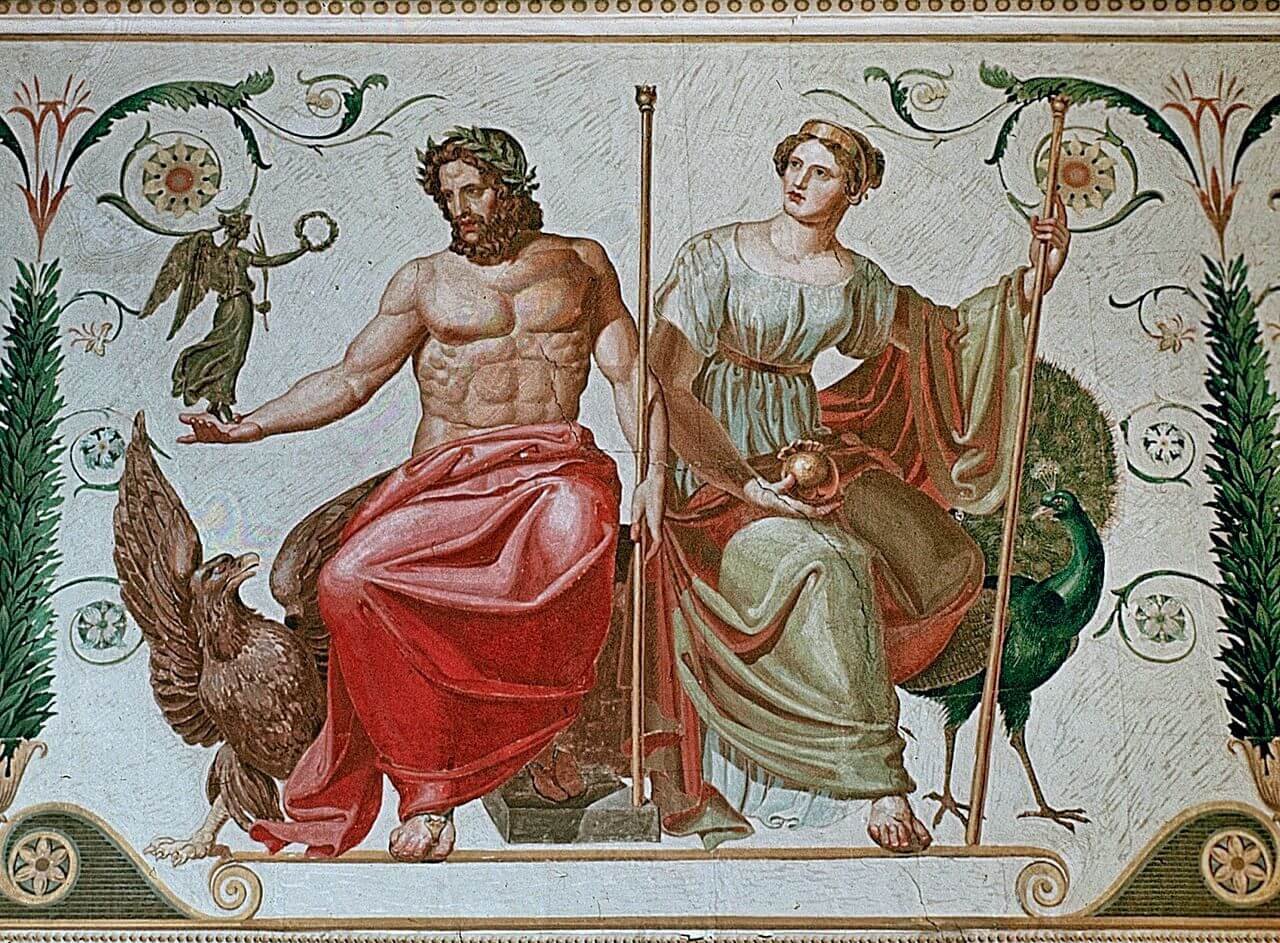
To explain such a character as Hera and her political dream, we should be thinking about a capitalist or religious dystopia. There the government had paralyzed the private trade and had forbidden the sources of knowledge and ideologies of strength in order to maintain a type of political regime, which main purpose is the suffering of people, extermination of heroes and the supremacy of wicked, resentful clergy and other types of bureaucrats.
However, Hera was never so strong as to obtain such a sort of absolute power. For that reason, she needed Zeus and the maximum expression of his thirst for tyranny. The same way as it happened in the Middle Ages in Europe.
To exterminate the health and will of free people!
The lawyers and sophists (the so-called prostitutes of knowledge by Aristotle) never liked the well-born and revolutionary. These wholehearted characters as Perseus and Heracles, got something, commonly detested by Hera: their naturally born talent, their amazing physical shape, their ability to smash and divide people, which they never used against humanity for the sake of their own profit.
Their exceptional individualism and goodness destroy the self-respect of Hera. They don’t rejoice the humiliation and suffering of simple citizens. Their reaffirmation as absolute tyrants is null and they are enemies of Hera’s strict order and believes. The rapture produced by their acclaimed victories is like a laugh onto the face of all the mediocrities and archons around the world. Hera is not interested in correct social hierarchy, she enjoys the fall of the best and usually is being embodied by the worse people and creatures.
Heracles was the foolish one and had accomplished many unnecessary feats, because of his feeling of guilt. Hera used this feeling to spoil his life and humiliate his honor. Thereafter, Heracles served to a pathetic and wicked king. Nowadays this feeling of guilt is widely used by capitalism and many nefarious people.
The Olympian Rebellion: Political Meaning
The sea knows the law of strength and brotherhood between the sailors. Therefore, the roles of each member on the deck of a ship are very well defined. In such a way as should be defined the correct social hierarchy. Thus according to the ancient Greeks the military democracy or generalist republic, personified by Poseidon, is a better type of society, than Zeus and Hera. Poseidon is a more intelligent and tolerant kind of Ares (Sparta), who would have been of a great help for the countless problems of Ancient Greece.
Goodwill and respectful position towards the faraway nations and their sovereignty, the development of trade and social justice throughout the whole territories of the state, would be essential for the nation, ruled by officers and other military superintendents. Since people would be hierarchically promoted according to their achievements and worth. Such a nation should be integrating trade, arts and science as an essential base for their stability and progress.
On the other hand, the government of philosophers, artists and scientists, leaded by Perseus or internally promoted kind of Theseus, (Ideal State of Athena) would be managing even a greater prosperity, progress and harmony, than the military democracy, personified by Poseidon.
Athena values the accurate path of truth, beauty and justice. There is no place for the despotism of Hera and her beloved husband. For that reason, Poseidon and Athena are the main suitors for the throne of Olympus.
Hera and Zeus is the archetypal tale of the law and basic quintessence of man. The constitution was already the wife of a conceited villain, but he needed to outrage her boundaries even stronger, and grow up as a tyrant and adulterer. The quintessence of a simple man never had been treated with the weight of a sword. Furthermore, the atrocious power of envy and resentment never had been destroyed by the rule of wisdom.
Hera pursued the great heroes of Greece, because of their indomitable and wholehearted personality. Meanwhile she was very compliant with her charming and little cuckoo. The military democracy, personified by Poseidon never ruled the humankind.
The undeserving people always had the money and the praiseworthy citizens had been always discriminated because of their talent and goodness. The military ranks never counted as a reference of social status and salaries for the entire nation. The warrior of Sparta was never involved and interested in trade, philosophy and science. He never treated all the citizens of Greece as members of his own ship crew. He never smashed the weak hand of Zeus, unable to hold a sword of steel. The spear of Athena and the trident of Poseidon never stuck Hera and Zeus to their golden thrones.
Perhaps Athena needed a hero, named Perseus to do such a thing and Poseidon had longed for his son Theseus and his black sail to cross the ocean of time and beyond.
Temples of Zeus and Hera.
The most favorite place of Hera on earth was the island of Samos, where, according to the Greeks, she married with Zeus. In memory of such an event the Greeks built a marvelous temple of Hera. Temples in her honor appeared all around the main centers of the Hellenic world.
In the town of Olympia, where the ancient Greeks honored the Father of gods, could not miss a temple dedicated to his wife. Besides the sanctuary ofZeus there stood a magnificent temple of Hera. On the other side in the city of Argos was placed the Hera’s most majestic statue by the sculptor Polykleitos. It was a sculpture of huge size, like the statues of Zeus at Olympia and Athena Parthenos, made of pure gold and ivory.
The goddess was depicted seating on a throne. Her head was crowned by a beautiful wreath adorned with embossed images of mountains and the three Graces. And in her hands she held a scepter with a cuckoo and a pomegranate fruit, as a symbol of fertile marriage and her ability to grant the wish of good progeny.
